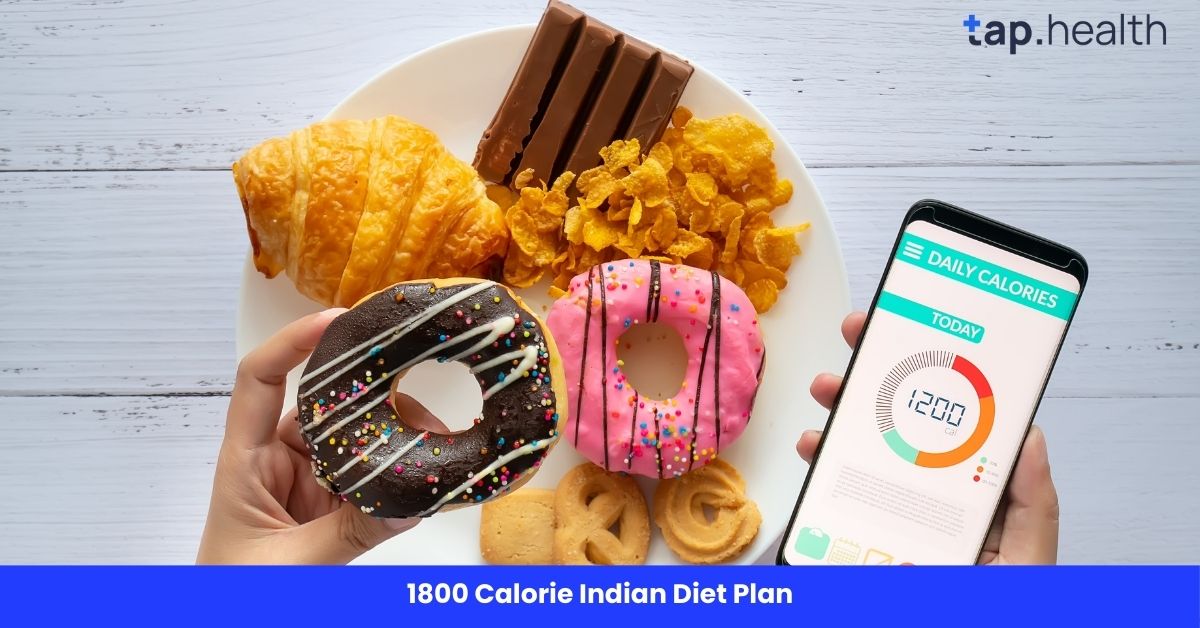Embarking on a journey toward better health starts with the right diet. Whether you’re aiming to lose weight, maintain a healthy lifestyle, or simply eat more balanced meals, an 1800 calorie Indian diet plan offers a structured approach tailored to meet your nutritional needs without compromising on taste. This comprehensive guide provides detailed meal plans, nutritional insights, practical tips, and answers to common questions to help you achieve your health goals effectively.
Why Choose an 1800 Calorie Diet?
An 1800 calorie diet is a balanced approach suitable for many adults, particularly those seeking moderate weight loss or maintenance. It provides sufficient energy to support daily activities while creating a calorie deficit necessary for weight reduction.
Benefits of an 1800 Calorie Diet
- Sustainable Weight Loss: Promotes gradual weight loss, reducing the risk of regaining weight.
- Nutrient Sufficiency: Ensures intake of essential vitamins, minerals, and macronutrients.
- Variety and Flexibility: Incorporates a wide range of foods to prevent monotony.
- Improved Metabolic Health: Supports metabolic functions and enhances energy levels.
- Better Portion Control: Encourages mindful eating habits and portion awareness.
Why 1800 Calories?
An 1800 calorie diet plan allows for an extra snack and a bit more starch than lower calorie diet plans, meeting the body’s needs for protein and carbohydrates. Compared to plans for 1200 or 1500 calories, the menus are quite similar in terms of food items. However, as the calories increase, the number of servings from different food groups throughout the day also rises. This consistency means that if a couple chooses to diet together but their calorie needs differ, they can still enjoy the same meals.
Who Should Consider an 1800 Calorie Diet?
- Active Females Seeking Weight Loss: Suitable for women with an active lifestyle aiming to shed pounds.
- Medium-Framed Men: Active men looking to lose weight.
- Large-Framed Men: Lightly active men who seek weight loss.
Regular exercise is crucial for overall health and can significantly aid in reaching your weight loss goals.
Safe Weight Loss Rate
A safe rate of weight loss is no more than 2 pounds (1 kg) per week. If you lose weight faster, consider increasing your calorie intake to the next highest level. Conversely, if your weight loss is slower, you might reduce your intake to a 1500 calorie plan. Remember, regular exercise not only promotes health but also helps burn more calories to achieve your weight goals.
Structuring Your 1800 Calorie Indian Diet Plan
A well-balanced 1800 calorie diet typically divides calories across three main meals and two snacks. This structure helps maintain energy levels and prevents overeating.
- Breakfast: 400 calories
- Mid-Morning Snack: 200 calories
- Lunch: 500 calories
- Afternoon Snack: 200 calories
- Dinner: 500 calories
Detailed Sample Meal Plan
Below is a 7-day meal plan designed to provide variety and balance while adhering to the 1800 calorie limit.
Sunday
Breakfast (8:00-8:30 AM)
- 2 Aloo Paranthas
- 1 cup curd
- 6 almonds
Mid-Morning Snack (11:00-11:30 AM)
- 1 cup pomegranate
- 1 guava
Lunch (2:00-2:30 PM)
- 1 cup parboiled rice or 3 chapatis
- 1/2 cup vegetable curry
- 1/2 cup dal
- 1/4 fresh lemon
- Salad
Afternoon Snack (4:00-4:30 PM)
- 1 cup green tea with 1/2 tsp honey
- 1 cup soybean chaap
Dinner (8:00-8:30 PM)
- 2 chapatis
- 1 cup chicken stew
- Salad
Daily Totals:
- Calories: ~1800
- Proteins: 60-80 g
- Carbohydrates: 220-260 g
- Fiber: 40-50 g
- Fats: 50-80 g
- Sodium: 1,500-2,500 mg
Monday
Breakfast (8:00-8:30 AM)
- 1 cup soy milk
- 1 cup cornflakes
- 1 ripe banana
Mid-Morning Snack (11:00-11:30 AM)
- 1 orange
- 1 cup grapes
Lunch (2:00-2:30 PM)
- 1 cup parboiled rice or 3 chapatis
- 1/2 cup vegetable curry
- 1/2 cup dal
- 1/4 fresh lemon
- Salad
Afternoon Snack (4:00-4:30 PM)
- 1 cup green tea with 1/2 tsp honey
- 4 almonds
- 5-6 raisins
Dinner (8:00-8:30 PM)
- 2 chapatis
- 1 cup vegetable curry
- Salad
Daily Totals:
- Calories: ~1800
- Proteins: 55-75 g
- Carbohydrates: 220-250 g
- Fiber: 35-45 g
- Fats: 45-70 g
- Sodium: 1,400-2,300 mg
Tuesday
Breakfast (8:00-8:30 AM)
- 2 vegetable sandwiches
- 1 cup orange juice
Mid-Morning Snack (11:00-11:30 AM)
- 1 cup pomegranate
- 1 guava
Lunch (2:00-2:30 PM)
- 1 cup parboiled rice or 3 chapatis
- 1 cup vegetable curry
- 1 cup dal
- 1/4 fresh lemon
- Salad
Afternoon Snack (4:00-4:30 PM)
- 1 cup green tea with 1/2 tsp honey
- 4 almonds
- 5-6 raisins
- 4 walnuts
Dinner (8:00-8:30 PM)
- 2 chapatis
- 1 cup chicken stew
- Salad
Daily Totals:
- Calories: ~1800
- Proteins: 60-80 g
- Carbohydrates: 230-260 g
- Fiber: 40-50 g
- Fats: 50-80 g
- Sodium: 1,500-2,400 mg
Wednesday
Breakfast (8:00-8:30 AM)
- 2 paneer paranthas
- 1 cup curd
- 6 almonds
Mid-Morning Snack (11:00-11:30 AM)
- 1 orange
- 1 cup grapes
Lunch (2:00-2:30 PM)
- 1 cup parboiled rice or 3 chapatis
- 1/2 cup vegetable curry
- 1/2 cup dal
- 1/4 fresh lemon
- Salad
Afternoon Snack (4:00-4:30 PM)
- 1 cup green tea with 1/2 tsp honey
- 1 cup paneer tikka
Dinner (8:00-8:30 PM)
- 2 chapatis
- 1 cup vegetable curry
- Salad
Daily Totals:
- Calories: ~1800
- Proteins: 55-75 g
- Carbohydrates: 220-250 g
- Fiber: 35-45 g
- Fats: 45-70 g
- Sodium: 1,400-2,300 mg
Thursday
Breakfast (8:00-8:30 AM)
- 1 cup soy milk
- 1 cup cornflakes
- 1 ripe banana
Mid-Morning Snack (11:00-11:30 AM)
- 1 cup pomegranate
- 1 guava
Lunch (2:00-2:30 PM)
- 1 cup parboiled rice or 3 chapatis
- 1 cup vegetable curry
- 1 cup dal
- 1/4 fresh lemon
- Salad
Afternoon Snack (4:00-4:30 PM)
- 1 cup green tea with 1/2 tsp honey
- 4 almonds
- 5-6 raisins
Dinner (8:00-8:30 PM)
- 2 chapatis
- 1 cup chicken stew
- Salad
Daily Totals:
- Calories: ~1800
- Proteins: 55-75 g
- Carbohydrates: 220-250 g
- Fiber: 35-45 g
- Fats: 45-70 g
- Sodium: 1,400-2,300 mg
Friday
Breakfast (8:00-8:30 AM)
- 2 vegetable sandwiches
- 1 cup orange juice
Mid-Morning Snack (11:00-11:30 AM)
- 1 orange
- 1 cup grapes
Lunch (2:00-2:30 PM)
- 1 cup parboiled rice or 3 chapatis
- 1 cup vegetable curry
- 1 cup dal
- 1/4 fresh lemon
- Salad
Afternoon Snack (4:00-4:30 PM)
- 1 cup green tea with 1/2 tsp honey
- 4 almonds
- 5-6 raisins
Dinner (8:00-8:30 PM)
- 2 chapatis
- 1 cup vegetable curry
- Salad
Daily Totals:
- Calories: ~1800
- Proteins: 55-75 g
- Carbohydrates: 220-250 g
- Fiber: 35-45 g
- Fats: 45-70 g
- Sodium: 1,400-2,300 mg
Saturday
Breakfast (8:00-8:30 AM)
- 2 dal paranthas
- 1 cup curd
- 6 almonds
Mid-Morning Snack (11:00-11:30 AM)
- 1 cup pomegranate
- 1 guava
Lunch (2:00-2:30 PM)
- 1 cup parboiled rice or 3 chapatis
- 1/2 cup vegetable curry
- 1/2 cup dal
- 1/4 fresh lemon
- Salad
Afternoon Snack (4:00-4:30 PM)
- 1 cup green tea with 1/2 tsp honey
- 4 almonds
- 5-6 raisins
- 4 walnuts
Dinner (8:00-8:30 PM)
- 2 chapatis
- 1 cup chicken stew
- Salad
Daily Totals:
- Calories: ~1800
- Proteins: 55-75 g
- Carbohydrates: 220-250 g
- Fiber: 35-45 g
- Fats: 45-70 g
- Sodium: 1,400-2,300 mg
Sunday
Breakfast (8:00-8:30 AM)
- 1 serving “Egg in a Hole” Peppers with Avocado Salsa
- 1 medium banana
Mid-Morning Snack (11:00-11:30 AM)
- 1 medium apple
Lunch (2:00-2:30 PM)
- 1 serving Curried Sweet Potato & Peanut Soup
Afternoon Snack (4:00-4:30 PM)
- 1 clementine
Dinner (8:00-8:30 PM)
- 1.5 servings Spinach & Artichoke Dip Pasta
- 2 cups mixed greens topped with 2 Tbsp. Balsamic Vinaigrette
Evening Snack (8:00-8:30 PM)
- 1 cup raspberries
- 1 oz. dark chocolate
Daily Totals:
- Calories: ~1800
- Proteins: 60-80 g
- Carbohydrates: 220-250 g
- Fiber: 40-50 g
- Fats: 50-80 g
- Sodium: 1,500-2,200 mg
Food Items to Limit
To ensure the effectiveness of your diet plan, it’s essential to limit certain foods that can hinder your weight loss goals.
Foods to Avoid:
- Simple Carbohydrates:
- Candy, soda, sugar, white rice, white pasta, white bread, sweet syrups, breakfast cereals, desserts, and pastries.
- Saturated Fats:
- Margarine, butter, eggs, milk, cheese, and red meat. These can raise cholesterol levels and increase the risk of heart disease.
- Fried Foods:
- Fried chicken, deep-fried snacks, and potato fries. High in unhealthy fats and calories.
- Alcohol:
- High in empty calories and can disrupt metabolism.
- Aerated and Artificially Sweetened Drinks:
- These can lead to increased cravings and disrupt appetite regulation.
Why Limit These Foods?
- High-Calorie Content: These foods are calorie-dense but nutrient-poor, leading to weight gain.
- Health Risks: Increased intake can lead to health issues like heart disease, diabetes, and obesity.
- Nutrient Imbalance: Consuming these foods can displace healthier options, resulting in nutrient deficiencies.
Reference: Drugs.com: 1800 Calorie Diabetic Diet
Do’s and Don’ts
Do’s:
- Eat Healthy Fats to Lose Weight:
- Incorporate sources like nuts, seeds, olive oil, and avocado.
- Eat 2-3 Hours Before Bed:
- Helps in better digestion and prevents late-night hunger pangs.
- Make Healthy Swaps:
- Replace unhealthy ingredients with healthier alternatives without compromising taste.
- Follow Smart Tips for Dining Out:
- Choose grilled over fried, request sauces on the side, and watch portion sizes.
Don’ts:
- Don’t Starve Yourself:
- Avoid skipping meals which can lead to overeating later.
- Don’t Dehydrate Yourself:
- Maintain adequate water intake to support metabolism and digestion.
- Don’t Eat if You’re Not Hungry:
- Listen to your body’s hunger cues to prevent unnecessary calorie intake.
- Don’t Eat Too Much Saturated Fat:
- Limit intake to maintain heart health and manage weight.
Foods You Can Easily Consume
Incorporate these nutrient-dense foods into your diet to stay satisfied and nourished.
- Non-Starchy Fruits and Vegetables:
- Apples, oranges, berries, spinach, broccoli, and cucumbers.
- Complex Carbohydrates:
- Whole grain bread and pasta, bran, brown rice, quinoa, and oats.
- Healthy Oils:
- Olive oil, vegetable oil, rice bran oil, canola oil, mustard oil, and peanut oil.
- Lean Proteins:
- Lentils, beans, soy, mushrooms, tofu, fish, turkey, chicken breast, and lean cuts of beef.
- Frequent Small Meals:
- Have five or six small meals throughout the day to keep metabolism active.
- Heavy Breakfast:
- Start your day with a substantial breakfast to kickstart your metabolism and maintain energy levels.
Source: EatingWell: How We Create Meal Plans
Top Dietitians/Nutritionists in Delhi
Seeking professional guidance can enhance your weight loss journey. Here are some top-rated dietitians in Delhi:
- Dr. Nutri Kalp Clinic
- Rating: 92% (278 ratings)
- Experience: 32 Years
- Qualifications: Master of Science (Home …)
- Consultation Fee: ₹500 at clinic
- Dt. Diets And More
- Rating: 90% (152 ratings)
- Experience: 11 Years
- Qualifications: Diploma in Diet and Nutrition
- Consultation Fee: ₹1,000 at clinic
- Dr. Swarnshikha Sharma
- Rating: 93% (2561 ratings)
- Experience: 16 Years
- Qualifications: Doctorate in Dietetics, Ph…
- Consultation Fee: ₹300 at clinic
- Dt. Ritika Dua
- Rating: 90% (203 ratings)
- Experience: 24 Years
- Qualifications: BSc-Diet & Nutrition, M.S…
- Consultation Fee: ₹1,000 at clinic
- Mrs. Kritika Bhola
- Rating: 91% (400 ratings)
- Experience: 19 Years
- Qualifications: BHOM, MD – Alternate Medicine
- Consultation Fee: ₹500 at clinic
- Ms. Divya Gandhi
- Rating: 88% (53 ratings)
- Experience: 12 Years
- Qualifications: Diploma in Diet & Nutrition
- Consultation Fee: ₹1,000 at clinic
- Dt. Rashima Arora
- Rating: Not Available
- Experience: 18 Years
- Qualifications: BSc-Food and Applied Nutrition
- Consultation Fee: ₹3,000 at clinic
- Dt. Raminder Deshmukh
- Rating: 88% (53 ratings)
- Experience: 33 Years
- Qualifications: PG Diploma in Dietetics
- Consultation Fee: ₹500 at clinic
- Dt. Shweta Diwan
- Rating: 91% (66 ratings)
- Experience: 19 Years
- Qualifications: Diploma in Dietetics and Nutrition
- Consultation Fee: ₹1,000 at clinic
- Dt. Megha Gupta
- Rating: 87% (48 ratings)
- Experience: 13 Years
- Qualifications: M.Sc – Dietetics / Nutrition
- Consultation Fee: ₹1,500 at clinic
[Note: Consult the clinic profiles for more details and to book an appointment.]
Tips for Success
- Plan Your Meals Ahead:
- Prepare a weekly meal plan to avoid last-minute unhealthy choices.
- Batch cook staples like dal and quinoa to save time.
- Practice Portion Control:
- Use measuring cups or a food scale to keep track of serving sizes.
- Be mindful of high-calorie foods and limit their portions.
- Incorporate Variety:
- Rotate different vegetables, grains, and protein sources to keep meals interesting and nutritionally balanced.
- Experiment with various Indian spices and herbs to enhance flavor without adding calories.
- Stay Active:
- Combine your diet plan with regular physical activity such as walking, jogging, yoga, or strength training.
- Aim for at least 30 minutes of moderate exercise most days of the week.
- Listen to Your Body:
- Eat when you’re hungry and stop when you’re full.
- Avoid emotional eating by finding alternative stress-relief methods like meditation or hobbies.
- Mindful Eating:
- Chew your food thoroughly and savor each bite.
- Avoid distractions like watching TV while eating to prevent overeating.
Source: Mayo Clinic: Weight Loss
Avoiding Common Pitfalls
- Skipping Meals:
- Can lead to overeating later in the day. Stick to your meal schedule to maintain energy levels and prevent excessive hunger.
- Hidden Calories:
- Be cautious of high-calorie sauces, dressings, and cooking oils. Opt for healthier alternatives or use them sparingly.
- Processed Foods:
- Limit intake of packaged snacks, sweets, and fast food which are often high in unhealthy fats, sugars, and sodium.
- Lack of Variety:
- Incorporate a diverse range of foods to ensure all nutrient needs are met and to keep meals interesting.
- Emotional Eating:
- Find non-food-related ways to cope with stress, such as exercising, reading, or engaging in hobbies.
[Advice: Focus on whole, unprocessed foods for maximum health benefits and better weight management.]
Incorporating Physical Activity
A balanced diet is most effective when combined with regular physical activity. Here’s how to integrate exercise into your routine:
- Cardio Exercises:
- Activities like walking, jogging, cycling, or swimming improve heart health and burn calories.
- Strength Training:
- Lifting weights or using resistance bands helps build muscle mass, which boosts metabolism.
- Flexibility and Balance:
- Yoga and stretching enhance flexibility, reduce stress, and improve overall well-being.
- Daily Movement:
- Incorporate more movement into your day by taking stairs, walking during breaks, or doing household chores.
Reference: CDC: Physical Activity
Adjusting the Diet Plan
Every individual’s body is unique, and your diet plan may need adjustments based on your progress and how you feel. Consider the following:
- Monitor Your Progress:
- Keep track of your weight, energy levels, and how your clothes fit. Adjust portions or food choices if needed.
- Listen to Your Body:
- If you feel excessively hungry or fatigued, reassess your meal sizes or nutrient balance.
- Consult a Nutritionist:
- For personalized guidance, especially if you have specific health conditions or dietary requirements.
- Stay Flexible:
- Allow occasional treats to prevent feeling deprived, but keep them within your calorie limit.
[Tip: Regularly evaluate your diet and make gradual changes to suit your evolving health needs.]
Frequently Asked Questions (FAQ) on 1800 calorie indian diet plan
Q1: Can I follow this diet plan if I’m vegetarian?
A1: Absolutely! The sample meal plan includes vegetarian options like dal, paneer, tofu, and a variety of vegetables. Ensure you incorporate diverse plant-based proteins to meet your nutritional requirements.
Q2: How long should I follow an 1800 calorie diet?
A2: The duration depends on your individual health goals. For weight loss, you might follow it until you reach your target weight. It’s advisable to consult with a healthcare professional for personalized advice.
Q3: Can I include sweets in this diet?
A3: Yes, in moderation. Opt for healthier alternatives like fruit-based desserts, dark chocolate, or limit sweets to a small portion occasionally to satisfy your cravings without exceeding your calorie limit.
Q4: What if I feel hungry between meals?
A4: Incorporate healthy snacks like fruits, nuts, yogurt, or vegetables with hummus. These options are nutritious and help keep hunger at bay without adding excessive calories.
Q5: Is this diet suitable for everyone?
A5: While an 1800 calorie diet works for many, individual needs vary based on factors like age, gender, activity level, and health conditions. It’s best to consult with a nutritionist or healthcare provider to tailor the plan to your specific needs.
Q6: Can I modify the meal plan based on my preferences?
A6: Yes, you can adjust the meal plan to include foods you enjoy while maintaining the overall calorie and nutritional balance. Just ensure substitutions are healthy and portion-controlled.
Q7: How do I handle eating out or social gatherings?
A7: Plan ahead by choosing healthier options available, control portion sizes, and avoid high-calorie foods. You can also inform the host about your dietary preferences to find suitable meal choices.
Q8: Will I feel hungry on an 1800 calorie diet?
A8: Not if the diet is balanced with high-fiber foods, proteins, and healthy fats that promote satiety. Drinking plenty of water and having regular meals also help manage hunger.
Q9: Can I lose muscle mass on an 1800 calorie diet?
A9: If your diet includes adequate protein and you incorporate strength training exercises, you can preserve or even build muscle mass while losing fat.
Q10: How can I stay motivated during my diet journey?
A10: Set realistic goals, track your progress, celebrate small achievements, seek support from friends or family, and remind yourself of the health benefits you’re aiming for.
Conclusion
Adopting an 1800 calorie Indian diet plan is a strategic approach to achieving your health and weight goals without sacrificing the flavors you love. By focusing on balanced meals rich in nutrients, practicing portion control, and incorporating regular physical activity, you can enjoy a sustainable and enjoyable path to better health. Remember to stay consistent, listen to your body’s needs, and seek professional guidance when necessary. Here’s to a healthier, happier you!
References
- Mayo Clinic: Weight Loss
- CDC: Physical Activity
- CDC: Hydration
- Drugs.com: 1800 Calorie Diabetic Diet



